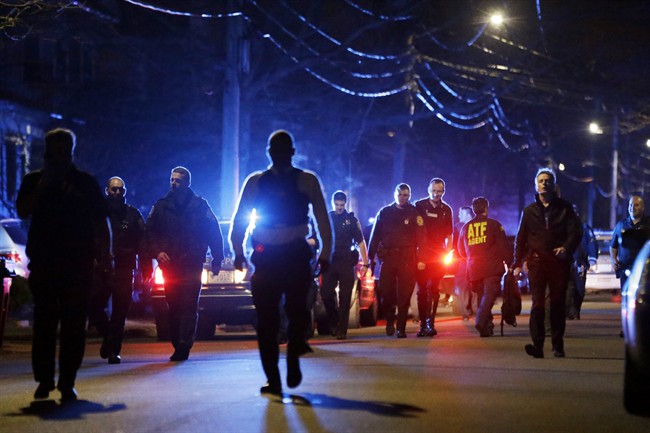Early Friday morning American authorities locked down the city of Boston, urged residents to stay indoors and shut down the transit system while they searched for the suspected bomber.

Airports in the area stayed open, but with heightened security. Land border crossings in neighbouring states were also on high alert. Canada too stepped up security.
“The Canadian Border Service Agency has taken a wide range of measures to increase vigilance and maximize the CBSA’s capacity to conduct risk assessments of people and goods before they arrive in Canada,” said a statement from the agency.
While the Canadian Border Service Agency refused to discuss what those measures are, William Anderson, director of the Cross-Border Transportation Centre has a guess.
“You just do the same thing, but you do it more intensively. You open more trunks of cars, you take more people in for additional screening, you just ramp everything up,” Anderson said. “It’s based on a risk assessment methodology and if you know that there is somebody at large, then obviously the risk is greater and so it justifies more concentration of resources on that.”
Anderson teaches at the University of Windsor, but was born in Boston. He offers an explanation for why Canada would need to increase security in the first place.
“There would have been a concern that if those people had fled from the Boston area they might look to cross into Canada as part of their attempt to escape justice,” Anderson said. “But if they feel like they’ve got their people, that might lighten it up a bit.”
- ‘Shock and disbelief’ after Manitoba school trustee’s Indigenous comments
- Canadian man dies during Texas Ironman event. His widow wants answers as to why
- Several baby products have been recalled by Health Canada. Here’s the list
- ‘Sciatica was gone’: hospital performs robot-assisted spinal surgery in Canadian first
He cautions that border security won’t return to normal quite yet because there is still a concern that there could be unknown collaborators at large.
For Canadians planning on traveling to the United States, Anderson thinks they might see a bit of a slowdown from a normal day, but doesn’t expect there to be a huge delay.
He says we could see less than the normal amount traffic traveling from Canada to the United States for the next few weeks because of the chilling effect the attack has had.
“I suppose you might say that some people are going to be more concerned about going and running in marathons in the United States because of the danger,” Anderson said. “But you have to put it in perspective. It is still an extremely unlikely event. So I’m not sure it has that much effect on people’s cross-border travel behaviour.”
But in the long-term, Anderson knows that acts of terrorism do have an effect on cross-border traffic. He worked on a study that found that if the 9/11 attacks hadn’t happened, trips between the United States and Canada would be at record levels. The study concluded this was due to the increased security at the border.
“Politicians and the public are going to be putting more pressure on Homeland Security and the result is that you’re going to have more focus on security at the border and other places as well,” Anderson said. “If anybody thought the focus on terrorism in North America was waning, I think this is going to turn everything around.”
With files from The Associated Press

Comments